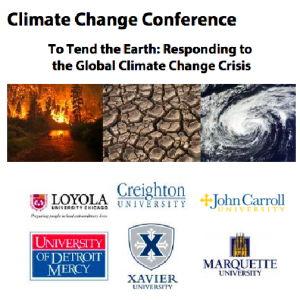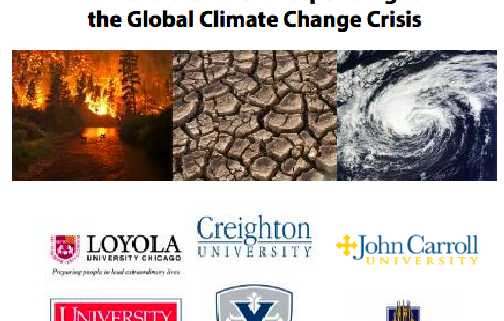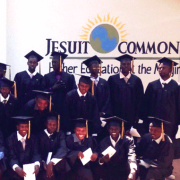Climate Change & Jesuit Higher Education: Reportback from Loyola Chicago #3

BY JAMES HUG S.J | March 20, 2015
James Hug, S.J. is attending Loyola University’s Chicago’s Climate Change Conference and will be offering reflections over the next few days.
The first day of the conference closed with a plenary lecture by Dr. George Crabtree, the Director of the Joint Center for Energy Storage Research (JCESR). He highlighted the need for better energy storage capability in efforts to reduce greenhouse gas emissions in addressing climate change. He described JCESR’s efforts to develop batteries capable of 5 times the power storage of contemporary batteries at 1/5th their current cost within 5 years in order to challenge the cost effectiveness of fossil fuels. And he called attention to the promising new research paradigm that JCESR represents.
Friday morning’s program featured a panel discussion on “The Risks, Nuts, and Bolts of Divestment” from fossil fuels. The panel was chaired by Bruce Boyd, Principal and Senior Managing Director of Arabella Advisors where he works with foundations to improve planetary health. Under his leadership, Arabella is now measuring the global commitment to divestment from fossil fuels and reinvestment in alternative, clean energy sources.
In his opening remarks, he noted that divestments are currently at $50 billion and are expected to reach $150 billion by the UN Climate meeting in Paris in December of this year. He reported that Global Divestment Day, February 13-14 this year, was marked by 450 events in 60 countries. There is significant movement globally. He welcomed Catholic involvement, quoting Pope Francis as declaring an “ineluctable ethical imperative” to act. He summed up his remarks with what he called the clear message to the world, “The age of burn what you want when you want is over.”
The first panelists were two student representatives from Seattle University, Iree Wheeler and Nico Cruz. Drawing inspiration from a 2013 talk on campus by 350.org’s Bill McKibben, students at Seattle U. held a rally, gathered signatures, and began a campus movement for divestment. Before long the student government and the faculty got on board and the proposal went to the university leadership.
There the effort hit a brick wall, with one official saying, ‘We don’t use the endowment to make political statements’ – a comment clearly embarrassing and uninformed for a leader in a school claiming a proud place in the Jesuit FaithJustice mission and supposedly guided by Catholic Social Tradition which recognizes political decisions as ethical decisions.
Though they didn’t get the Seattle University leadership to agree to divestment, the students did succeed in getting the university to look at the ethical implications of their investments and establish a committee on socially responsible investing.
Lessons learned? They recognized that their movement had not been sophisticated enough about how investments work. Nor were they prepared when they made the proposal to suggest worthwhile places to reinvest the funds currently supporting fossil fuel development and use. They are continuing their work, participating in the socially responsible investing committee, widening their focus from divestment to broader, related social justice issues, introducing community organizing principles, and drawing upon the strong call from the Jesuit Superior General never to rest content with social injustice.
The focus on what they learned provides helpful tips for other student movements as they organize to turn divestment/reinvestment into a national movement on university campuses, especially Catholic campuses.
Could Jesuit campuses lead the way?
The Ignatian Solidarity Network could coordinate campus efforts and support the networking and collaboration.
Could you take leadership on your campus?
James E. Hug, S.J., has a long history working in social ethics and social justice advocacy in the Catholic community. He served 24 years as the President of the Center of Concern, a Washington, DC based social justice institute rooted in Catholic social tradition, working for greater economic, social, and ecological justice globally. He holds a doctoral degree in Christian ethics from the University of Chicago and a master’s degree in Christian spirituality from St. Louis University.
Fr. Hug’s research has focused on issues of faith and economic justice and he has lectured and directed workshops throughout the U.S. and in Europe, Asia, Africa, and Australia. Currently he serves as sacramental minister for the Adrian Dominican Sisters and writes on issues of spirituality for social transformation in these difficult times. His blog, “Truth that does Justice,” can be found on the website for the Dominican Center: Spirituality for Mission, www.dominicancenter.org.
Past publications have included Catholic Social Teaching: Our Best Kept Secret, Social Revelation: Profound Challenge for Christian Spirituality, and Tracing the Spirit: Communities, Social Action, and Theological Reflection. Jim has also written chapters for Globalization and Catholic Social Thought: Present Crisis, Future Hope and The Pastoral Circle Revisited: A Critical Quest for Truth and Transformation.
Fr. Hug’s research has focused on issues of faith and economic justice and her has lectured and directed workshops throughout the U.S. and in Europe, Asia, Africa and Australia. He was the editor of the Center of Concern’s “Catholic Social Teaching: Our Best Kept Secret, author of Social Revelation: Profound Challenge for Christian Spirituality,” and the editor of “Tracing the Spirit: Communities, Social Action, and Theological Reflection.” Jim has also written chapters for “Globalization and Catholic Social Thought: Present Crisis, Future Hope” and “The Pastoral Circle Revisited: A Critical Quest for Truth and Transformation.”











Leave a Reply
Want to join the discussion?Feel free to contribute!